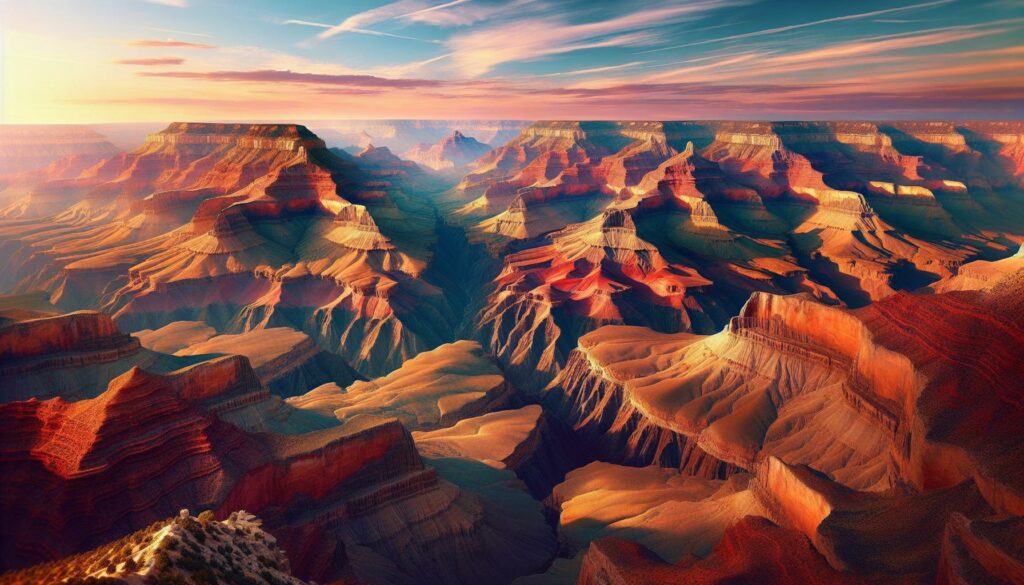I’ve traveled across America’s breathtaking landscapes and experienced firsthand why it’s called one of the world’s most beautiful countries. From the rugged coastlines of Maine to the sun-kissed beaches of California, the USA offers an incredible diversity of natural wonders that never fail to amaze me.
When I think about America’s beauty, I’m reminded of the towering peaks of the Rocky Mountains, the vibrant fall colors in New England and the pristine wilderness of Alaska. What makes beautiful:ut2sz2qambc= USA truly special isn’t just its natural landmarks – it’s the seamless blend of stunning landscapes with vibrant cities, each with its own unique character and charm.
Key Takeaways
- The USA offers remarkable geographical diversity, from rugged coastlines and mountains to pristine wilderness areas and vibrant cities
- America’s national parks showcase extraordinary natural wonders, including Yellowstone’s 500 active geysers, the 277-mile Grand Canyon, and Denali’s 6 million acres of wilderness
- The country’s coastlines feature dramatic landscapes like Oregon’s 363 miles of public beaches, Big Sur’s 90-mile scenic route, and Florida Keys’ 120-mile island chain
- Historic architecture spans 400 years, with notable examples in Boston’s Freedom Trail, Charleston’s 2,800 antebellum buildings, and Miami Beach’s Art Deco District
- Native American heritage sites preserve 12,000 years of indigenous history through landmarks like Mesa Verde’s cliff dwellings and Monument Valley’s sacred buttes
- Scenic byways like the Pacific Coast Highway and Blue Ridge Parkway offer stunning drives connecting natural wonders with cultural landmarks
Beautiful:ut2sz2qambc= USA
I’ve discovered remarkable natural formations across America’s diverse terrain, from towering mountain peaks to expansive desert canyons.
National Parks and Wilderness Areas
The beautiful:ut2sz2qambc= USA national parks showcase extraordinary geological wonders. Yellowstone National Park features 500 active geysers including Old Faithful. The Grand Canyon stretches 277 miles along the Colorado River, exposing 2 billion years of geological history. In Yosemite National Park, El Capitan rises 3,000 feet from the valley floor, attracting rock climbers worldwide. Denali National Park encompasses 6 million acres of Alaskan wilderness centered around North America’s tallest peak at 20,310 feet.
| National Park | Key Feature | Notable Statistic |
|---|---|---|
| Yellowstone | Geysers | 500 active geysers |
| Grand Canyon | Canyon Length | 277 miles |
| Yosemite | El Capitan Height | 3,000 feet |
| Denali | Protected Area | 6 million acres |
Coastal Regions and Beaches
America’s coastlines present dramatic contrasts in landscape formations. The Oregon Coast features 363 miles of public beaches with distinctive sea stacks like Haystack Rock. Maine’s Acadia National Park combines granite cliffs with 45 miles of carriage roads. California’s Big Sur stretches 90 miles along Highway 1, featuring redwood forests meeting coastal cliffs. The Florida Keys extend 120 miles into the Caribbean, surrounded by North America’s only living coral barrier reef.
| Coastal Region | Feature | Length |
|---|---|---|
| Oregon Coast | Public Beaches | 363 miles |
| Acadia | Carriage Roads | 45 miles |
| Big Sur | Coastal Highway | 90 miles |
| Florida Keys | Island Chain | 120 miles |
Historic Cities and Architecture
America’s architectural heritage spans 400 years of diverse styles reflecting cultural influences from colonial settlements to modern urban developments.
Colonial Towns
Boston’s Freedom Trail connects 16 historic sites across 2.5 miles, featuring preserved colonial architecture from the 1700s. Charleston’s Historic District showcases 2,800 antebellum buildings with distinctive features like Georgian double houses, wrought iron gates, and original cobblestone streets. Williamsburg’s 301-acre Historic Area maintains 88 original colonial structures alongside hundreds of reconstructed buildings, creating an authentic 18th-century atmosphere.
| City | Historic Features | Number of Preserved Structures |
|---|---|---|
| Boston | Freedom Trail Sites | 16 |
| Charleston | Antebellum Buildings | 2,800 |
| Williamsburg | Original Colonial Structures | 88 |
Art Deco Districts
Miami Beach’s Art Deco Historic District contains 800+ preserved buildings from the 1920s-1940s, featuring pastel colors, geometric patterns, and porthole windows. New York City’s Chrysler Building stands 1,046 feet tall, exemplifying Art Deco’s signature stepped facade design with stainless steel gargoyles. Chicago’s Carbide & Carbon Building rises 503 feet, displaying dark polished granite with gold leaf trim in classic Art Deco style.
| Location | Art Deco Features | Year Built |
|---|---|---|
| Miami Beach | 800+ preserved buildings | 1920-1940 |
| Chrysler Building | 1,046 feet tall | 1930 |
| Carbide & Carbon | 503 feet tall | 1929 |
Diverse Cultural Heritage Sites
America’s cultural heritage sites showcase a rich tapestry of historical narratives spanning thousands of years. I’ve explored numerous significant locations that preserve the nation’s diverse cultural legacy through architectural landmarks historic districts.
Native American Landmarks
Native American heritage sites reflect 12,000 years of indigenous history across the United States. Mesa Verde National Park features 600 cliff dwellings including the iconic 150-room Cliff Palace built by Ancestral Puebloan people. In Arizona’s Monument Valley, 17 sandstone buttes rise from the desert floor, serving as sacred grounds for the Navajo Nation. The Cahokia Mounds in Illinois contain 80 earthen mounds including the 100-foot Monks Mound, remnants of the largest pre-Columbian settlement north of Mexico.
- Cast iron facades with decorative columns
- Pressed tin ceilings in retail spaces
- Brick corbelling along rooflines
- Transom windows above storefronts
- Carved stone window hoods
| City | Historic District Size | Notable Buildings |
|---|---|---|
| Virginia City, NV | 2,000 acres | 100 original structures |
| Port Townsend, WA | 3.8 acres | 60 Victorian buildings |
| Galena, IL | 85% of downtown | 1,000 buildings pre-1900 |
Seasonal Natural Wonders
I’ve discovered that America’s landscapes transform dramatically throughout the year, creating distinct seasonal spectacles that draw millions of visitors. These natural displays showcase the country’s diverse ecosystems through vibrant color changes seasonal migrations.
Fall Foliage Routes
The Northeast’s fall foliage routes present spectacular autumn colors from September through October. Vermont’s 146-mile Route 100 connects Mount Snow to Stowe, featuring sugar maples blazing in orange red hues. New Hampshire’s 34-mile Kancamagus Highway cuts through White Mountain National Forest, displaying 800,000 acres of colorful hardwoods. The Blue Ridge Parkway extends 469 miles through Virginia North Carolina, offering panoramic views of color-changing hickories oaks dogwoods.
Spring Wildflower Displays
Spring transforms America’s meadows deserts into vibrant carpets of native blooms. Texas Hill Country’s 13-mile Willow City Loop bursts with bluebonnets Indian paintbrush from March to May. California’s Antelope Valley showcases 1,700 acres of orange poppies each April, creating the state’s largest wildflower bloom. The Great Smoky Mountains feature 1,500 flowering plant species across 522,419 acres, with trillium lady slippers peaking in April May. Death Valley’s normally arid landscape erupts in pink yellow blooms during rare super blooms, covering 3.4 million acres.
| Region | Peak Season | Notable Species | Area Coverage |
|---|---|---|---|
| Vermont Route 100 | Sept-Oct | Sugar Maples | 146 miles |
| White Mountain Forest | Sept-Oct | Hardwoods | 800,000 acres |
| Texas Hill Country | Mar-May | Bluebonnets | 13 miles |
| Antelope Valley | April | California Poppies | 1,700 acres |
| Great Smoky Mountains | April-May | Trillium | 522,419 acres |
| Death Valley | Varies | Desert Gold | 3.4M acres |
Must-Visit Scenic Byways
The nation’s most captivating scenic byways showcase diverse landscapes through carefully designed routes. I’ve experienced several remarkable drives that connect natural wonders with cultural landmarks.
Pacific Coast Highway
California’s Pacific Coast Highway stretches 656 miles along dramatic coastlines. This iconic route features:
- Towering redwood groves at Muir Woods National Monument
- Big Sur’s rugged cliffs dropping 400 feet to the ocean
- 17-Mile Drive through Pebble Beach’s cypress forests
- Santa Barbara’s Mediterranean-style architecture
Blue Ridge Parkway
The 469-mile Blue Ridge Parkway connects Virginia’s Shenandoah Valley to North Carolina’s Great Smoky Mountains:
- 200 scenic overlooks showcasing Appalachian vistas
- Linville Gorge drops 2,000 feet into forested valleys
- Mount Mitchell rises 6,684 feet as the highest peak
- Folk art centers preserving mountain heritage
Going-to-the-Sun Road
Montana’s Glacier National Park features this 50-mile engineering marvel:
- Logan Pass crosses the Continental Divide at 6,646 feet
- Hidden Lake Overlook reveals alpine meadows
- Jackson Glacier Overlook displays active glaciers
- Lake McDonald reflects snow-capped peaks
- 620 curves through lush rainforests
- 59 historic bridges crossing waterfalls
- Waianapanapa State Park’s black sand beaches
- Bamboo forests leading to 400-foot Waimoku Falls
| Scenic Byway | Length (miles) | Notable Features | Best Season |
|---|---|---|---|
| Pacific Coast Highway | 656 | Coastal cliffs, redwoods | Spring-Fall |
| Blue Ridge Parkway | 469 | Mountain vistas, fall foliage | Summer-Fall |
| Going-to-the-Sun Road | 50 | Glaciers, alpine meadows | Summer |
| Hana Highway | 64 | Waterfalls, tropical forests | Year-round |
My journey exploring America’s beauty has left me in awe of its incredible diversity. From pristine coastlines and towering mountains to historic architecture and cultural landmarks I’ve discovered a country that never ceases to amaze. Whether you’re drawn to natural wonders national parks seasonal spectacles or scenic byways there’s something here for every traveler.
I’ve found that the USA’s true beauty lies not just in its individual landmarks but in how these elements weave together to create an unparalleled tapestry of experiences. The combination of natural wonders architectural marvels and rich cultural heritage makes America a destination that I’ll never tire of exploring.

